
Ulver is a Norwegian experimental electronica band founded in 1993, by vocalist Kristoffer Rygg. Their early works, such as debut album Bergtatt, were categorised as folklore-influenced black metal, but the band has since evolved a fluid and increasingly eclectic musical style, blending genres such as experimental rock, electronica, ambient, trip hop, symphonic and chamber traditions, noise, progressive and experimental music into their oeuvre. 1997 marked their international debut with the release of their third album Nattens madrigal through German label Century Media. However, following discord with the label, Rygg formed his own imprint, Jester Records, in 1998.

Nattens Madrigal – Aatte Hymne Til Ulven I Manden is the third studio album by Norwegian band Ulver, issued on 3 March 1997 via Century Media. Composed and arranged during the first half of 1995, Nattens is a concept album about wolves, the night, the moon, and the dark side of mankind.

A Quick Fix of Melancholy is the fourth EP by Norwegian experimental collective Ulver. Produced in the Winter of 2002, the EP was issued on 26 August 2003 via Jester Records. A precursor to the album Blood Inside, A Quick Fix of Melancholy showcases the band's ability to seamlessly combine ambient and electronic music with orchestral elements.
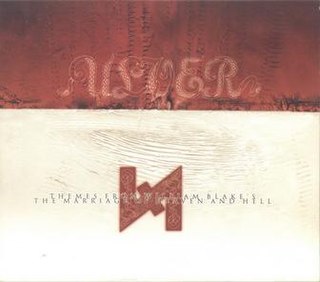
Themes from William Blake's The Marriage of Heaven and Hell is the fourth studio album by Norwegian experimental electronica band Ulver. Produced with Kristoffer Rygg, together with Knut Magne Valle and Tore Ylwizaker, it was issued on 17 December 1998 via Jester Records. It is a musical adaptation of William Blake's poem The Marriage of Heaven and Hell. The album blends electronics, industrial music elements, progressive metal, avant-garde rock and ambient passages, following Blake's plates as track indexes. Stine Grytøyr, Ihsahn, Samoth and Fenriz all feature as guest vocalists.

Kveldssanger is the second studio album by Norwegian band Ulver, issued in March 1996 via Head Not Found. The album was recorded at Endless Lydstudio, Oslo, Norway in the summer and autumn of 1995, with Kristian Romsøe as engineer and co-producer.

Perdition City is the fifth studio album by Norwegian experimental electronica band Ulver, issued in March 2000, via Jester Records. The album was recorded and produced by Kristoffer Rygg and Tore Ylwizaker, mixed by Ylwizaker at Beep Jam Studio and mastered by Audun Strype at Strype Audio.
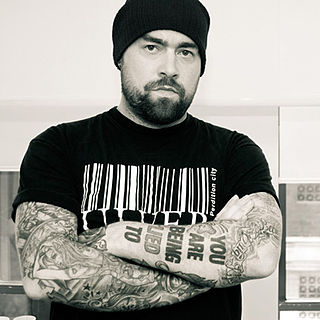
Kristoffer Rygg, also known as Garm, Trickster G. Rex and God Head, is a Norwegian vocalist, musician and producer known primarily for his work with Ulver, Arcturus, and Borknagar.

Karma is the ninth studio album by Canadian industrial/electronic music group Delerium.

Blood Inside is the sixth full-length studio album by Norwegian experimental electronica band Ulver. Produced by Ulver, together with Ronan Chris Murphy, the album was recorded and mixed in early 2004, and issued in June 2005 via Jester Records. The album sees Ulver return to more classically-based arrangements and instrumentation.

Metamorphosis is the first EP by Norwegian experimental electronica band Ulver. Written and produced by Kristoffer Rygg and Tore Ylwizaker, the EP was issued on 27 September 1999 via Jester Records. The EP showcased Ulver's new electronic musical direction that would become more readily apparent on the album Perdition City.
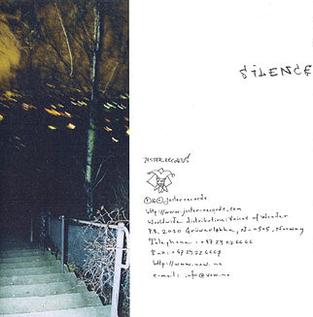
Silence Teaches You How to Sing is an EP by Norwegian experimental electronica band Ulver. Recorded and mixed in February 2001, the EP was issued by Jester Records in September 2001. Loosely recorded during the sessions for the Perdition City, together with Silencing the Singing, the EP is a subtle counterpart to the more dramatic full-length, issued in March 2000.

Silencing the Singing is an EP by Norwegian experimental collective Ulver. Recorded and mixed in February 2001, the EP was issued by Jester Records in December 2001. Loosely recorded during the sessions for the Perdition City, together with Silence Teaches You How to Sing, the EP is a subtle counterpart to the more dramatic full-length, issued in March 2000.

Teachings in Silence is a compilation album by Norwegian collective Ulver. Issued through American independent label Black Apple Records in March 2002, it combines Silence Teaches You How to Sing and Silencing the Singing, originally issued in September and December 2001, respectively. It was subsequently released in Europe one year later by Norwegian record company Jester Records. Due to the experimental nature of the music, both Silence EPs were limited to two thousand, and three thousand copies.
Lyckantropen (2002) is a Swedish short film written and directed by Steve Ericsson. It follows a family in a small town that struggles with relationship balance and internal emotional conflicts. The film is only 28 minutes long and features minimal dialogue throughout.

Svidd neger is an original soundtrack album by Norwegian experimental collective Ulver. The soundtrack was commissioned by Filmfalken AS. from Ambassaden, Oslo, and Norsk Film, Bærum, Norway, recorded between September 2002 and April 2003. The album was issued by Jester Records on September 15, 2003. The music is more elaborate than the abstract minimalism of Lyckantropen Themes. Stated on the sleeve: “Music for and Inspired by Svidd neger as perceived by Ulver. What you hear is not strictly what you see. All for the director in you.”

Shadows of the Sun is the seventh studio album by the Norwegian experimental electronica band Ulver. Produced by Ulver, the album was issued in October 2007 via Jester Records and The End Records. Officially announced on 13 July 2007, Shadows of the Sun received critical acclaim on release, and was described as "dark and tragic", with "soothing electronics and natural percussion". The album features contributions from Pamelia Kurstin on theremin, Mathias Eick on trumpet, and Austrian white noise musician Christian Fennesz adding electronics and helping Ulver to correspond with their vision on the final product.
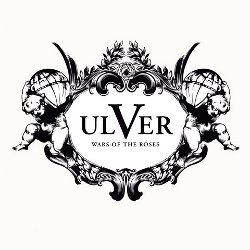
Wars of the Roses is the eighth studio album by the Norwegian experimental electronica band Ulver. The album was produced by Ulver, with John Fryer and Jaime Gomez Arellano, and issued in the UK on 25 April 2011 via Jester Records and Kscope, preceded by a single, "February MMX", in February. The album was released in the U.S. on 3 May 2011. Wars of the Roses is the first album to feature new member, British composer and multi-instrumentalist Daniel O'Sullivan.
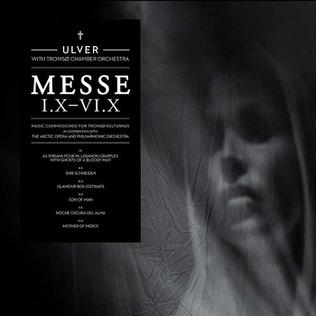
Messe I.X–VI.X is the ninth studio album by the Norwegian experimental electronica band Ulver, created in collaboration with the Tromsø Chamber Orchestra with additional aid from composer Martin Romberg. Written and produced by Ulver, released on October 8, 2013, via Jester Records and Kscope.

1993–2003: 1st Decade in the Machines is a remix album commissioned by Ulver, issued on April 29, 2003 via Jester Records. The album celebrates Ulver's ten year anniversary and features remixes by Ulver, Alexander Rishaug, Information, The Third Eye Foundation, Upland, Bogdan Raczynski, Martin Horntveth, Neotropic, A. Wiltzie vs. Stars of the Lid, Fennesz, Pita, Jazzkammer, V/Vm and Merzbow.

Riverhead is an original motion picture soundtrack album by Norwegian experimental collective Ulver for Justin Oakey's 2016 film of the same name. The album was issued in December 2016 via House of Mythology.


















